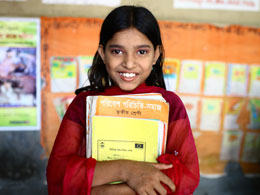
"There are approximately 57 million children of primary school age who are not in school, including 32 million girls and almost 30 million children living in situations of conflict. Moreover, many children do not complete primary school - in developing countries only 87 out of every 100 children complete their primary education. Seventy-one million children of lower secondary age are out of school, and millions of young people are not provided the education and training to develop the skills and competencies needed for a successful transition to adult life and decent jobs" (UNICEF, 2013)
From as far as I can remember, I have always been in school. I was at school more than I am at home. I stayed late after school just because I could. I graduated from elementary school, went on to high school and will soon graduate from my second program in college. I have close to 20 years of school experience and there most likely will be more ahead of me. Growing up, I always thought the right to education was universal. However, i was wrong. Because of their gender, something that was not their choice, some girls are not allowed to have proper or higher education in their country.
As a student and a female, it pains me to see that there are girls around the world who are unable to attend school. I cannot understand what it is like to live in a society where I am not allowed to learn due to my gender. I mean, it does sound silly, right? Not being able to attend school because of my gender... Well, it is true and it is happening around the world. UNICEF is currently promoting the rights of education for girls in developing countries. UNICEF and their partners are committed to ensuring girls get obtain an education by overcoming barriers by helping girls play an active role in their own learning and achievements.
It's a shame thing 57 million kids are involuntarily out of school. It's sad to see so many kids unable to go to school while in our western culture we have millions just throwing away their education.
ReplyDeleteYou have made a great point about how different cultures view the value of education. We grew up in a society where the only thing we knew was that one must be well educated to qualify for well paying jobs. However, we hear stories and have friends who drop out of school because there are better opportunities waiting for them. Education is something we can pick up and put on hold to our liking, especially for those enrolled in college/university. We don't have to stick to a particular major if we change our mind half way through a program. Some say education is an investment and some say it is a waste of time. Can we say that those living with a Western viewpoint take their education for granted?
DeleteFrom what I can see the western world has a different view of what education mean. Let's be honest many of us are just regurgitating information that our parents have told us at a very young age. The typical "stay in school to get a good job". In the end the ultimate goal is not to get a bachelors degree in business so we can get an entry level sales job but rather teach us how to live life ie. read, write, balance cheque books, and *cough personal finance so we don't spend money we don't have on shoes and transformers. We just need to make sure those who have the desire to learn can get easily access to the right resources. The end goal will be to open a library and with access to the internet so they can have everything they want to learn within their fingertips.
DeleteDo you think countries such as India and Pakistan are to blame for the majority of the children not getting educated. In my experiences I feel it's in their culture to put kids to work as young as possible in order support their families. It is sad because many of these families are already in poverty and unlike in Canada they cannot afford to pay for their children's education (think college tuition but from kindergarten through grade 12, and good luck getting an OSAP there). It is a cycle of poverty and girls are the main target since soceity has this perception of women being stay at home moms, and parents see them as a liability that they will eventually have to pay dowry towards which cause them to not get a proper education. We see similar patterns in China but the parents are more aware of how education is able to break the cycle of poverty so many of them find a way to get an education. How can we make India/Pakistan more like China?
ReplyDelete